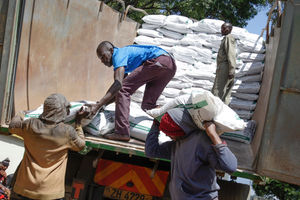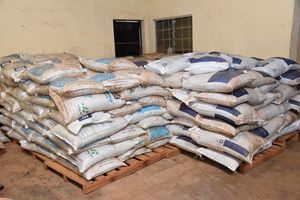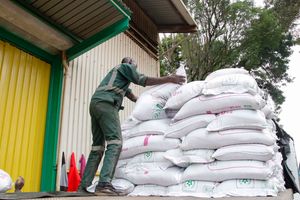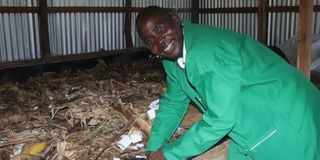
Kibmist Enterprises Ltd General Manager Maurice Juma sorts organic waste at the production site in Rodi Kopany.
The planting season is here and many farmers are running up and down looking for inputs that will ensure maximum yields.
However, agriculture faces many challenges and there is no guarantee that what is sold as inputs during planting is the right material.
Last year, the country witnessed farmers being supplied with fake fertiliser. Others fell prey to criminals who sold them fake seeds.
A solution to this problem is organic farming. Experts and environmentalists in Homa Bay County have established an agribusiness that is taking the lead in supplying locally made organic fertiliser.
Kibmist Enterprises Ltd applies vermicomposting technology to produce liquid organic fertiliser (vermi-liquid fertiliser), which is poison-free and friendly to all crops.
Vermiculture is the scientific cultivation of earthworms, often used in vermicomposting – using worms to convert organic waste into nutrient-rich compost.
At the production site near Rodi Kopany, workers convert at least 10 tonnes of organic waste every week to 6,000 litres of organic fertiliser.
The work by the group is recognised by the European Union, the Deutsche Gesellschaft für Internationale Zusammenarbeit (GIZ) and Agri-business Facility for Africa.
These agencies offered the group two-year financial support from June 2024 to expand the business and locals switch to organic farming.
Kibmist is among the few groups in Africa that gets such support to promote climate-smart and agro-ecological practices on maize and other crops.
“The group was established in 2016 with the purpose of conserving the environment and supporting women and young people practising climate smart agriculture,” Kibmist General Manager Maurice Juma says.
The work at the time involved collecting organic waste and using it to make manure.
Juma says the group later introduced Eisenia fetida (red worms) in the breaking down waste into fertiliser.
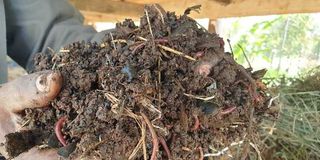
Vermiculture manure. The work done by the group is recognised by the European Union and other agencies.
“The final product does not interfere with biodiversity,” he says.
Over the years, the team has developed ideas on improving the production of organic manure, including liquid fertiliser.
Juma, a waste management specialist, says Kibmist has a team called street beautifiers that collects waste from markets to production sites every week.
The beautifiers mainly collect fruits whose seeds are used to propagate tree seedlings.
“Other parts of the fruits are used to produce liquid fertiliser. It is mixed with other organic materials like banana, potato, cabbage peels and vegetables,” he says.
After delivery, the waste is sorted. Later, what was collected is put into wooden compost boxes with polythene lining. Here, decomposition takes place and liquid organic fertiliser is sourced.
In the compost cubicles are red worms, which feed on food remains before producing their own waste – the main ingredient in the liquid fertiliser. At least two tonnes of worms do the breaking down of waste.
“We got the worms from Jomo Kenyatta University of Science and Technology,” Juma says.
To get vermi-liquid fertiliser, workers sprinkle water on the waste. It trickles to the bottom of the holding compartments.
Waste from the worms, which contains catalytic enzymes, then gets dissolved before draining to an underground tank. The liquid is later pumped to a storage unit.
From here, it is put into containers measuring one, two or five litres before being sold for Sh300 per litre.
“We plan to automate the packaging and produce more fertiliser,” Juma says.
Raphael Omondi, the production manager at Kibmist, says studies show vermi-liquid fertiliser performs better than synthetic fertiliser.
Different crops have been planted at the site and are used to monitor how the fertiliser works. Plants given liquid organic fertiliser are greener and taller compared to others.
Omondi says the group findings are backed by studies conducted by other top agricultural institutions like Murray State University in the United States of America alongside other agencies in India and China.

